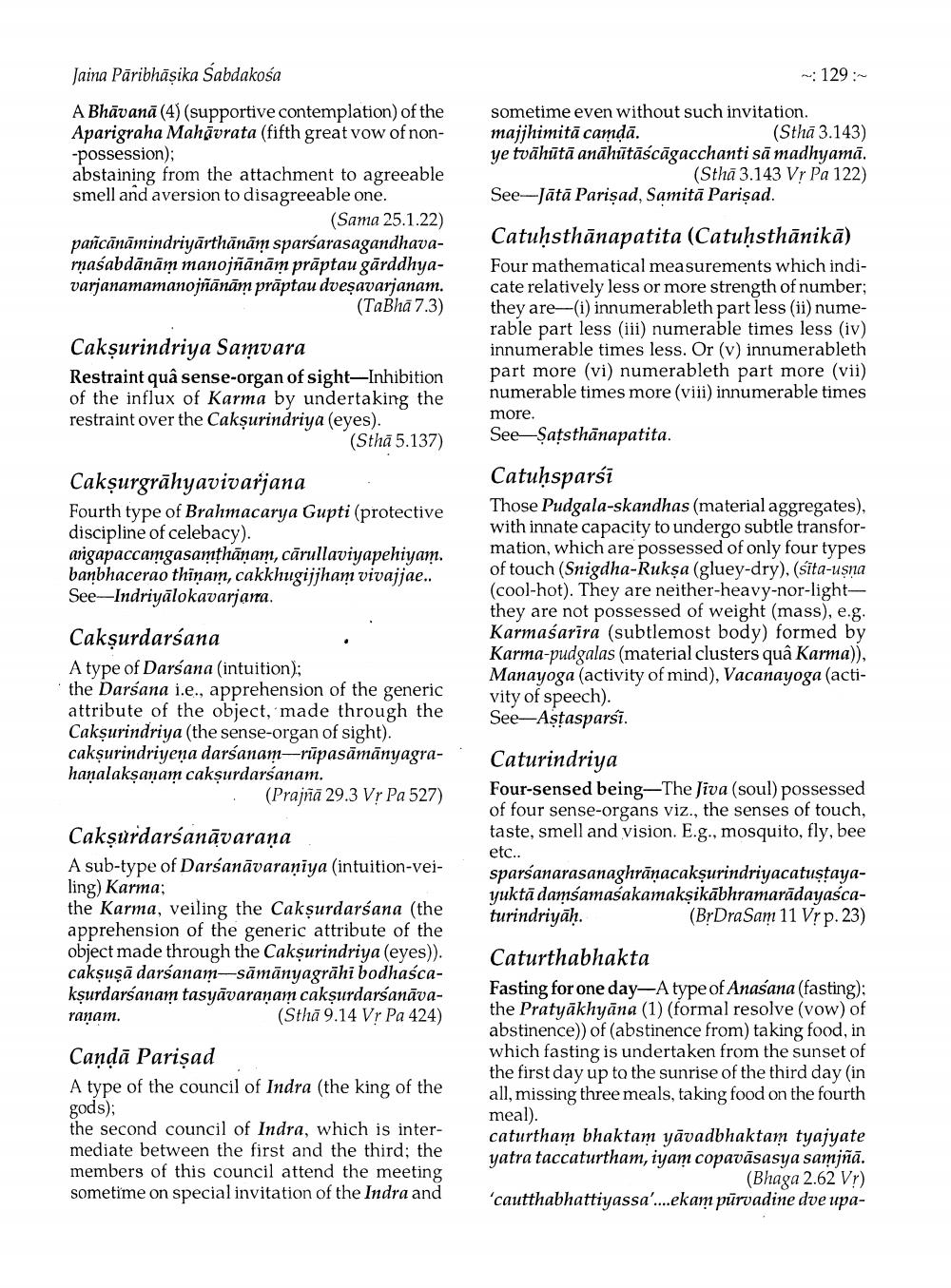________________
Jaina Pāribhāșika Sabdakosa
- 129:
sometime even without such invitation. majjhimitã camdã.
(Sthā 3.143) ye tvāhūtā anāhūtāscāgacchanti sā madhyamā.
(Sthā 3.143 Vr Pa 122) See--Jātā Parişad, Samitā Parişad.
A Bhāvanā (4) (supportive contemplation) of the Aparigraha Mahāvrata (fifth great vow of non-possession); abstaining from the attachment to agreeable smell and aversion to disagreeable one.
(Sama 25.1.22) pascānāmindriyārthānām sparsarasagandhavarņaśabdānām manojñānām prāptau gārddhyavarjanamamanojnānām prāptau dveşavarjanam.
(Tabhā 7.3)
Cakşurindriya Samvara Restraint quâ sense-organ of sight-Inhibition of the influx of Karma by undertaking the restraint over the Cakşurindriya (eyes).
(Sthā 5.137)
Catuhsthānapatita (Catuhsthānikā) Four mathematical measurements which indicate relatively less or more strength of number: they are(i) innumerableth part less (ii) numerable part less (iii) numerable times less (iv) innumerable times less. Or (v) innumerableth part more (vi) numerableth part more (vii) numerable times more (viii) innumerable times more. See-Sațsthānapatita.
Catuhsparsi Those Pudgala-skandhas (material aggregates), with innate capacity to undergo subtle transformation, which are possessed of only four types of touch (Snigdha-Ruksa (gluey-dry), (śīta-usna (cool-hot). They are neither-heavy-nor-lightthey are not possessed of weight (mass), e.g. Karmaśarira (subtlemost body) formed by Karma-pudgalas (material clusters quâ Karma)), Manayoga (activity of mind), Vacanayoga (activity of speech). See-Astasparsi.
Cakşurgrāhyavivarjana Fourth type of Brahmacarya Gupti (protective discipline of celebacy). arigapaccamgasamthānam, cărullaviyapehiyam. banbhacerao thiņam, cakkhugijjham vivajjae.. See--Indriyālokavarjara. Cakşurdarśana A type of Darsana (intuition); the Darsana i.e., apprehension of the generic attribute of the object, made through the Cakşurindriya (the sense-organ of sight). cakşurindriyeņa darsanam-rūpasāmānyagrahaņalaksanam cakşurdarsanam.
: (Prajñā 29.3 V? Pa 527) Cakşurdarśanāvaraņa A sub-type of Darsanāvaraņiya (intuition-veiling) Karma; the Karma, veiling the Cakşurdarśana (the apprehension of the generic attribute of the object made through the Cakşurindriya (eyes)). cakṣuşā darsanam-sāmānyagrāhi bodhascakşurdarśanam tasyāvaranam cakşurdarśanāvaranam.
(Sthā 9.14 Vr Pa 424)
Caturindriya Four-sensed being—The Jiva (soul) possessed of four sense-organs viz., the senses of touch, taste, smell and vision. E.g., mosquito, fly, bee etc.. sparśanarasanaghrāṇacakşurindriyacatustayayuktā damsamasakamaksikābhramarādayascaturindriyāḥ.
(BrDraSam 11 Vyp. 23)
Caņdā Parişad A type of the council of Indra (the king of the gods); the second council of Indra, which is intermediate between the first and the third; the members of this council attend the meeting sometime on special invitation of the Indra and
Caturthabhakta Fasting for one day-A type of Anasana (fasting); the Pratyākhyāna (1) (formal resolve (vow) of abstinence)) of (abstinence from) taking food, in which fasting is undertaken from the sunset of the first day up to the sunrise of the third day (in all, missing three meals, taking food on the fourth meal). caturtham bhaktam yāvadbhaktam tyajyate yatra taccaturtham, iyam copavāsasya samjñā.
(Bhaga 2.62 Vr) 'cautthabhattiyassa'....ekam pūrvadine dve upa




